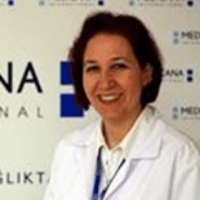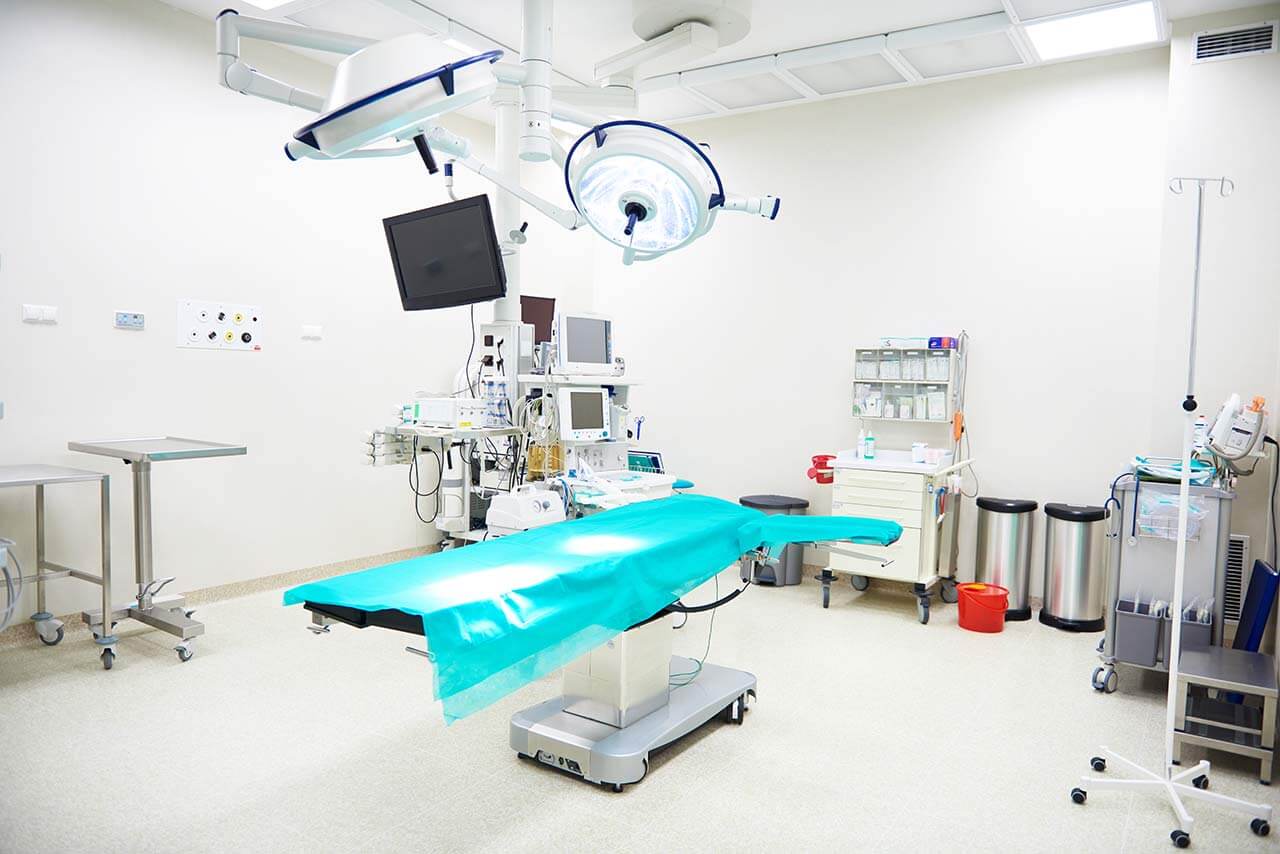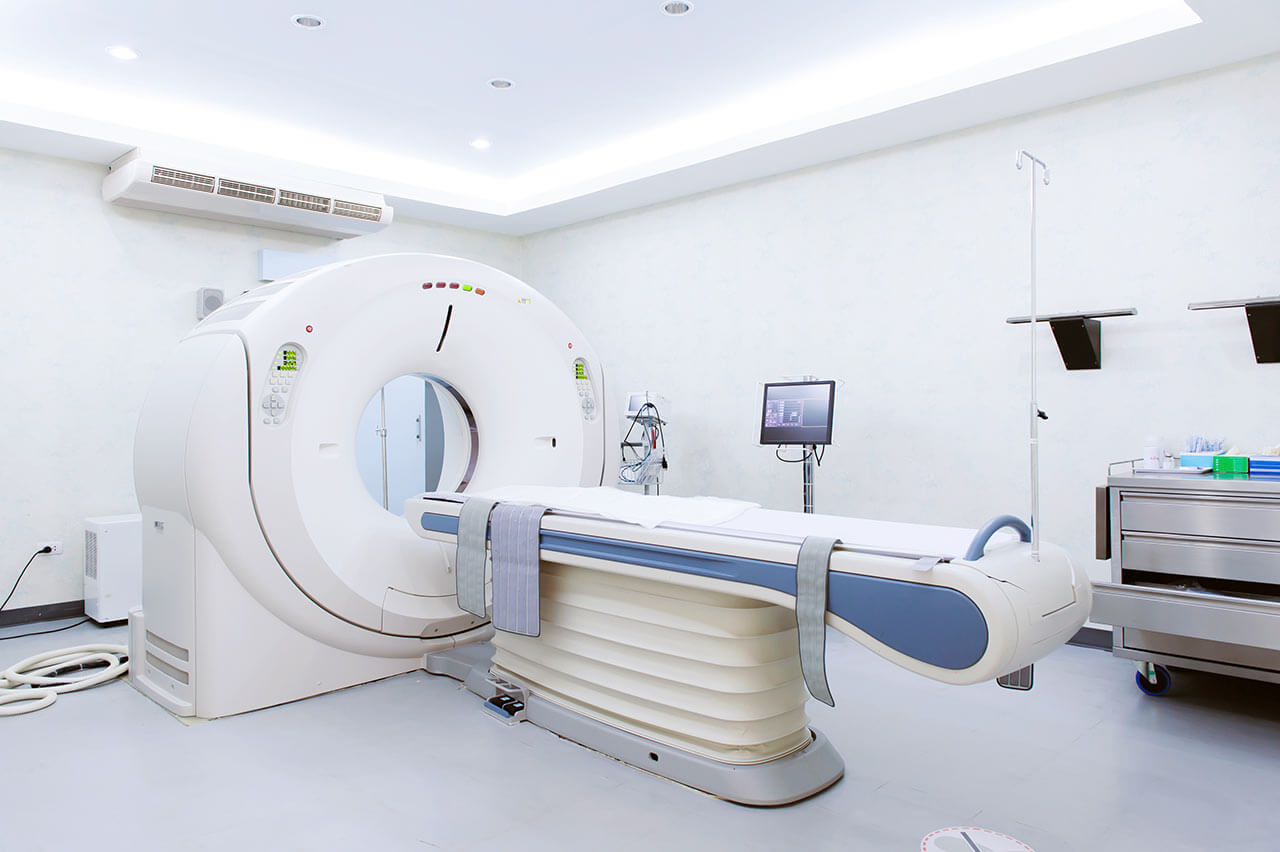
The program includes:
- Initial presentation in the clinic
- clinical history taking
- review of medical records
- physical examination
- laboratory tests:
- complete blood count
- general urine analysis
- biochemical analysis of blood
- inflammation indicators (CRP, ESR)
- TSH-basal, fT3, fT4
- indicators of blood coagulation
- CT planning of radiation therapy
- full course of conventional radiation therapy
- symptomatic treatment
- cost of essential medicines and materials
- nursing services
- control examinations
- consultations of related specialists
How program is carried out
During the first visit, the doctor will conduct a clinical examination and go through the results of previous laboratory tests and instrumental examinations. After that, you will undergo an additional examination, including complete blood count, laboratory assessment of liver and kidney function. Based on the received results, the physician will conduct radiotherapy planning with the help of CT or MRI, make the permanent tattoo marks on the skin and conduct CT simulation in order to assess the accuracy of the rays and the radiation dose. If necessary, related medical specialists will be involved in the elaboration of a treatment regimen (tumor board).
Radiation therapy is carried out as the day hospital procedure, without mandatory admission to the hospital. At each visit, the physician will assess your general condition and the marks on the skin. After that, you will be placed in a shielded radiation therapy room, on a special table.
Each radiation therapy session lasts less than half an hour (including preparation). All this time, doctors and nurses are monitoring your condition, you can communicate with them through a loudspeaker. The procedure is completely painless. Depending on the planned course of treatment, you will visit the hospital from 1 to 3-5 times a week.
After the completion of the radiation therapy course, you will undergo control examinations aimed at assessing your condition and efficacy of treatment. After that you will receive the medical report with detailed recommendations regarding further follow-up and treatment. In the future, you will be able to have a distant consultation with your attending physician and schedule the next course of treatment, if necessary.
Required documents
- Medical records
- MRI/CT scan (if available)
Service
You may also book:
 BookingHealth Price from:
BookingHealth Price from:
About the department
The Department of Radiation Oncology and CyberKnife Treatment at the Medicana International Istanbul Hospital offers all types of modern radiation therapy and state-of-the-art CyberKnife method against cancer. The department's specialists have excellent skills in performing intensity-modulated radiation therapy, intraoperative radiation therapy, new generation radiation therapy (VERSA HD), as well as practice the CyberKnife therapy, brachytherapy and other innovative treatments. For these purposes, the department is equipped with the cutting-edge medical equipment, for example, low- and high-energy LINAC linear accelerators, brachytherapy systems, etc. The department is headed by Prof. Dr. med. Füsun Tokatlı.
The service range of the department includes:
- CyberKnife treatment (stereotactic radiosurgery). This treatment method is the most effective for brain and spinal tumors (in primary and metastatic tumors), but it also gives positive results in the treatment of tumors of the liver, adrenal glands, prostate, lung and other organs. The CyberKnife system uses the high-tech imaging techniques and software. This allows the doctor to adjust the power and bring the radiation beams to the target sites very accurately, while monitoring the tumor movement and the patient's body. When CyberKnife is used, the incisions and anesthesia are not made, therefore this type of treatment has a minimal risk profile. The treatment is provided on an outpatient basis and allows the patient to return to his normal life as soon as possible.
- Brachytherapy (internal radiation therapy). This method of radiation therapy implies the temporary or permanent placement of radioactive materials inside the patient's body (in the tumor or near it) to reduce the volume or completely destroy cancer cells. The essence of therapy lies in the fact that the ionizing radiation from radioactive materials destroys the cancer cell DNA, disrupting their ability to divide. In this case, the cells die and the tumor regresses. Brachytherapy is widely used to treat tumors of the cervix, uterus, prostate, vagina, esophagus, rectum, tongue, and other organs.
- Intensity-modulated radiotherapy (IMRT). This is a modern innovative method of radiation therapy, the essence of which lies in the fact that the radiation is modulated in intensity, depending on the results of previously performed CT. The method allows the doctor to accurately determine the dose of radiationб which is directed to a particular area of the tumor. The tumor is irradiated at different angles, which minimizes the dose of radiation affecting the healthy tissue. This type of therapy is an excellent option for tumors of the bone tissue, brain and spinal cord, mammary gland, female genital organs, prostate, gastrointestinal tract, lungs, etc.
- Intraoperative radiation therapy. This treatment method is based on supplying a single high dose of ionizing radiation with the help of an electron beam from the high-energy accelerators directly during the surgery. The depth of penetration of radiation into the thickness of tissue can vary from a few millimeters to four centimeters, depending on the specific situation. In some cases, intraoperative radiotherapy can completely replace postoperative radiotherapy or significantly reduce its duration. This type of radiation therapy is the most effective against the tumors localized in the breast, lungs, pelvic organs, abdominal cavity, limbs, as well as in the cranial cavity.
- 3D conformal radiation therapy. This irradiation method is based on the volume planning technology. In other words, the shape of the irradiated tissue volume is as close as possible to the shape of the tumor. The procedure is performed using modern linear accelerators.
- Other treatment methods
Curriculum vitae
Education and Professional Experience
- 1985 Cerrahpaşa School of Medicine, Istanbul University.
- 1991 Postgraduate Education, Residency, Department of Radiation Oncology, Cerrahpaşa School of Medicine, Istanbul University.
- 1992 - 1993 Guy’s Hospital, London, Department of Radiation Therapy (under the direction of Dr. Adrian Timothy and Dr. Jane Dobbs).
- 2006 Department of Radiation Oncology, School of Medicine, Trakya University.
- Since 2008, Head of the Department of Radiation Oncology and CyberKnife Treatment, Medicana International Istanbul Hospital.
Areas of Specialization
- Breast and gynecologic cancers.
- Intensity-modulated radiotherapy (IMRT).
- Brachytherapy.
Memberships
- Turkish Society of Radiation Oncology.
- European Society for Radiotherapy and Oncology (ESTRO).
- American Society for Radiation Oncology (ASTRO).
Photo of the doctor: (c) Medicana Health Group
About hospital
The Medicana International Istanbul Hospital is a modern medical institution, which provides patients with an individual approach, excellent health service and attentive care. The hospital is part of the largest Turkish network of the Medicana hospitals. Due to its long successful clinical activities, this network has won the leading positions in the national and international medical arena. The hospital has the prestigious Joint Commission International certification.
The total area of the medical facility is about 30,000 square meters, it consists of two modern buildings. The hospital has excellent infrastructure, accurate diagnostic systems, unique computerized medical devices. To provide surgical treatment, it has 8 state-of-the-art operating rooms, as well as special equipment for minimally invasive and robotic interventions.
The main focuses of the hospital specialization include liver transplantation, bone marrow transplantation, in vitro fertilization, hair transplantation and treatment of oncological diseases. The hospital annually diagnoses and treats thousands of patients both from Turkey and European countries. It employs the outstanding medical specialists with academic thinking, who use in their work innovative technologies and the very latest drugs, as well as pay due attention to the human attitude and respect for the patient.
Photo: (c) depositphotos
Accommodation in hospital
Patients rooms
The patients of the Medicana International Istanbul Hospital live in comfortable modern rooms designed in light brown colors. The standard room includes an automatically adjustable bed, bedside table, wardrobe, shower, toilet and TV. The patient rooms have the Internet access. The hospital also provides the enhanced-comfort rooms.
Meals and Menus
The patients of the hospital are offered tasty and balanced three meals a day: buffet breakfast, lunch and dinner. Also, with appropriate clinical indications or if desired, a diet, individual menu may be provided.
Further details
Standard rooms include:





